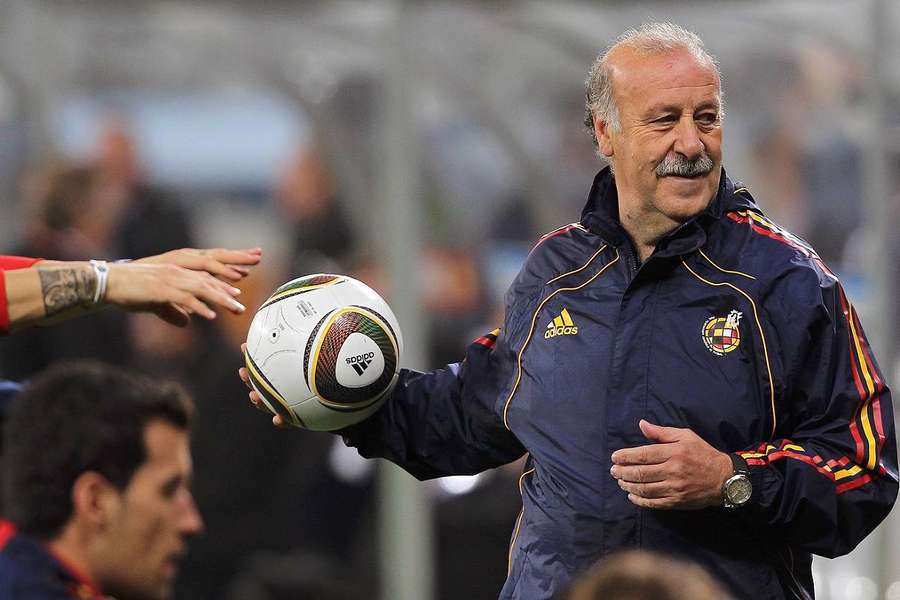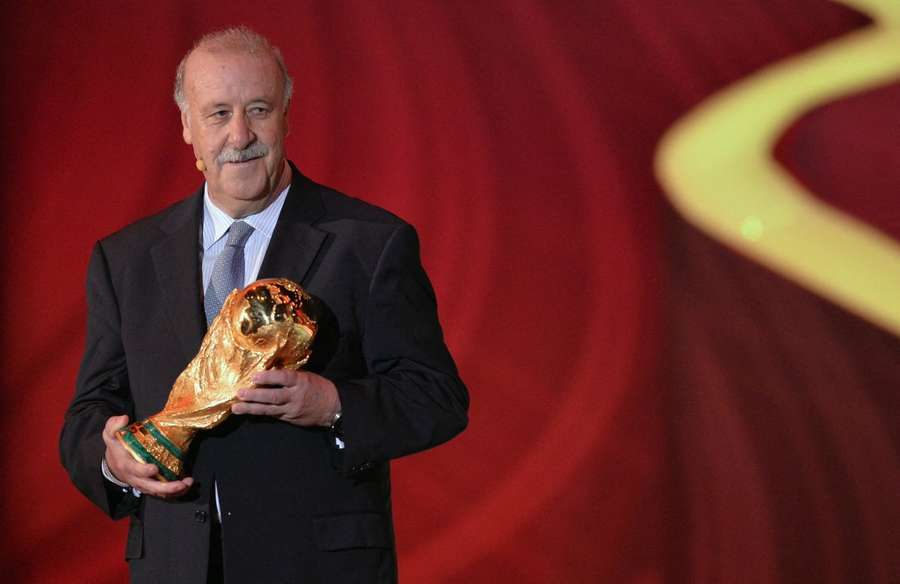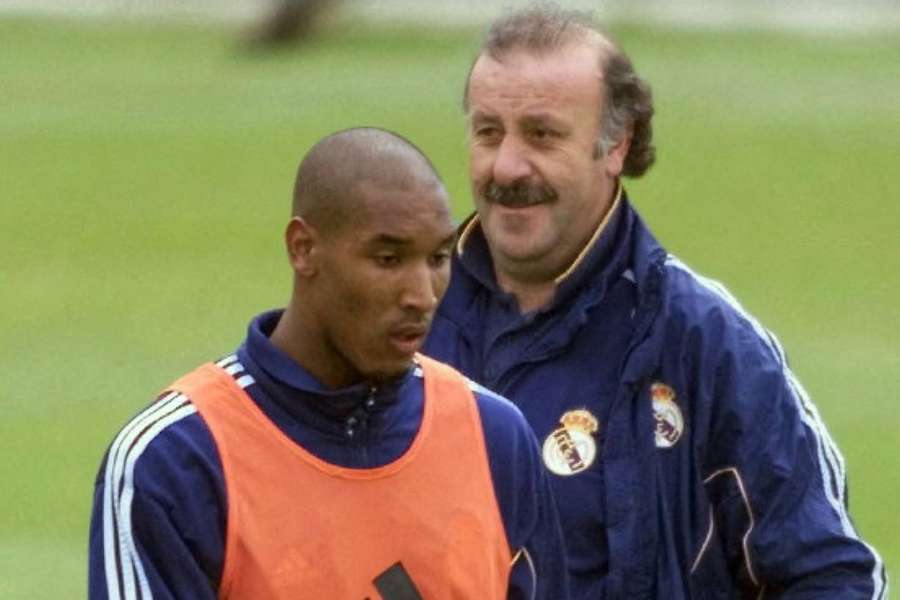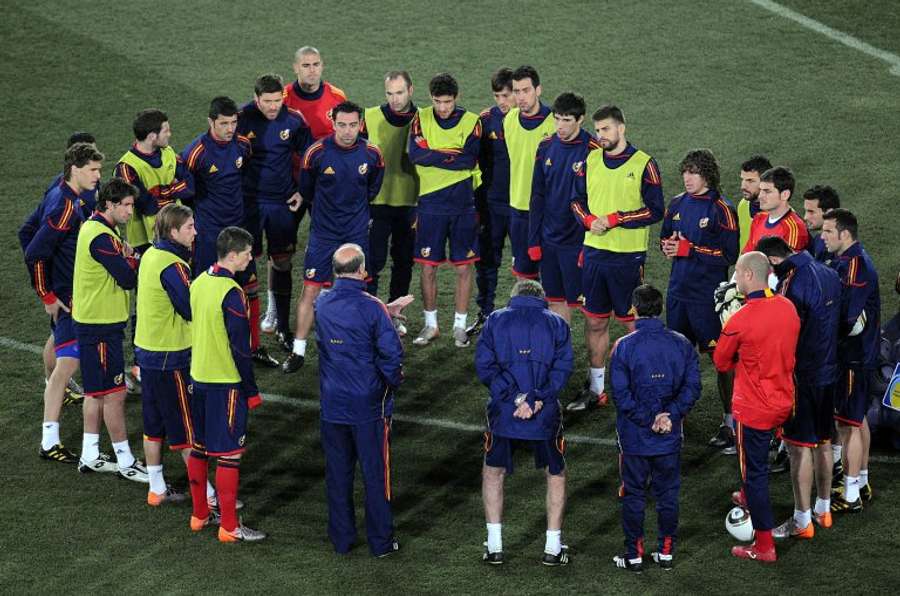EXCLUSIVE: Vicente Del Bosque explains the keys to his success with Real Madrid and Spain

Del Bosque will go down in history for his achievements as a football coach. As a player, the Spaniard made his mark at Real Madrid, winning nine trophies between 1973 and 1984, but it was as a coach that the Salamanca native made his mark on the history of football.
He won almost every trophy possible with Real Madrid and the Spanish national team; one World Cup (2010), one European Championship (2012), two Champions Leagues (2000, 2002), two LaLiga titles (2001, 2003), one Intercontinental Cup (2002), one European Super Cup (2002) and one Spanish Super Cup (2001). Only the Copa del Rey and the Confederations Cup escaped his clutches.
As a result, Vicente del Bosque is a name that will forever be enshrined in the pantheon of the sport. A master of management, the Spaniard has managed the most renowned dressing rooms with the Galacticos and Spain, and wherever he has gone, the players have respected, appreciated and listened to him. What are the keys to a coach's success in managing a dressing room full of stars? We spoke to him Del Bosque to find out.

Question: Would you agree that the name "Vicente del Bosque" is synonymous with success?
Answer: "I've been lucky enough to be at a club that, as a player and as a coach, has always been at the top. Of course, we've also lost... but in the end, that's part of the life of a football player or coach. You don't always win, you don't always succeed... Nevertheless, I've been lucky enough to be at a club, like Real Madrid which, at the end of the day, is constantly among the elite."
When Real Madrid decided to put you in charge of the first team in November 1999, the team had just lost the Madrid derby and were eleventh in LaLiga. What were the first tools you put in place to try and turn things around? Of course, they didn't bear fruit straight away, because after a 3-2 win over Rayo Vallecano (who were top of the league at the time), the team went four games without a win...
"We had to manage what I call 'poverty', at a time when the team was in a very bad position. At other times, we had to manage 'wealth', for example when we took over Luis Aragones' national team, who were European champions.
"As coaches, what we try to do in difficult moments - as in my case in November 1999 - is to put in place the foundations that would give us not immediate results - even if that was an objective - but above all the tools to look to the future with a good eye.
"Unfortunately, we got off to a very bad start, and yet we ended up becoming European champions... I'm more interested in this management, in this 'richness' and 'poverty' that a coach needs to know how to read... And in addition to these two major facets, or major tasks, that fall to a coach, there's the human relations between the players, the creation of a healthy atmosphere, a strong working environment. That's what we've always tried to achieve, that's something I've always believed in. I knew that if we achieved that, we would be closer to success."
In LaLiga, the team only managed to climb to fifth place. To date, that's the last time Real Madrid have been outside the Champions League places. And it was against this backdrop that the club's eighth European triumph arrived, your first success... You finished second in your group, only ahead of Dynamo Kiev thanks to the head-to-head record, then knocked out the reigning champions at Old Trafford and the team considered the best in the world at the time, Bayern, before teaching Valencia a lesson in the final. How do you explain that? What were the keys to winning this European Cup?
"One of the keys was tactics, from the quarter-finals right through to the final. We changed a few things. We tried to strengthen our full-backs, to give Michel Salgado and Roberto Carlos more freedom, so we played with three experienced central defenders. Then we had a midfielder in front, a player like Fernando Redondo, who needed to be on his own, to handle and control the ball.
"In the end, we adapted perfectly to the players we had. We gave Raul freedom... In short, I think we were lucky to have a good group and we gradually led them towards a common goal, trying to move them in the right direction so that we became a team."
You've always had a good reputation for your dressing room management. Your first star player to join was Nicolas Anelka. What did you think of the signing and how did you manage such a complicated situation, culminating in his decisive role in the Champions League semi-final? At the time, he was the most expensive signing in the history of football.
"Yes, in the end, he became a very important man for us. What happened was that he went through some difficult moments in terms of his integration. He was a good lad and a very good person, and we liked him a lot, but he came from another country, another culture, and in short, had a bit of trouble adapting, to the point where he thought we were happy when he didn't score goals.
"We had to tell him that we didn't care if it was (Fernando) Morientes who scored a goal, if it was Raul, if it was him or if it was anyone else... The important thing for us was to form a team and try to win. And he was, as you say, decisive in winning this eighth European Cup. His goal in Munich was very important, from a cross from the right, from memory, from Savio.
"The fact is that we tried to integrate Nicolas into the group and I think that when he came back in, he was happy and at ease. And in the end, we managed to win the European Cup together, which was essential for us, because let's not forget, as I think you said, that we finished fifth in the league, which meant that we couldn't qualify for the Champions League the following year unless we won it.
"All in all, it was a difficult period for the club. Changes of managers at any club are always very uncomfortable... even more so for a club like Real Madrid, which has always tried to have institutional and sporting stability."

Once the eighth European Cup had been won, you had to manage the transition to the Galacticos era, the arrival of a new president, Florentino Perez, and the incorporation of Luis Figo, who had been Barcelona captain. How did you manage to get him into your team in the best possible conditions and get the best out of him from the outset?
"As always, with the utmost normality. I think that's the way things should be. Luis had extraordinary courage, the move from Barcelona to Madrid, the arrival of a new president... I also think that it was a period of adaptation for everyone and that we got a good response from all the players. We've tried to treat all the players equally, in the same way. To give them all their place in the team.
"The truth is that we got a magnificent response from the players we had: (Fernando) Hierro, Raul, Redondo, Roberto Carlos, Michel Salgado - all these players formed a base to which all those who arrived later adapted perfectly into...
"I think that, often, the most important thing is that these players felt at home at Real Madrid. They felt comfortable on a day-to-day basis, they felt comfortable in training, they were happy and, ultimately, they managed to achieve success... We can't forget that over these four years, we always reached the semi-finals of the European Cup, and that's no mean feat."
In other words, still among the top four in Europe...
"Exactly, and what's more, with a very good attitude from the players, apart from the occasional annoyance when a player doesn't play, or when he's sent off, but those are situations that happen, they don't mean anything. I often say that you have to dig a lot to find a player who didn't behave as he should have... We were very lucky."
In the 2001/2002 season, the year of the ninth Champions League, you had another issue to deal with, that of the goalkeeper. What were your reasons for benching Iker Casillas in favour of Cesar, and do you think it was the right decision today?
"I don't regret what happened. It was a question of managing a dressing room and a squad that, at the time, seemed ideal. And that's while recognising the enormous virtues of Iker Casillas at the time, and in the career he had at Real Madrid, without underestimating a goalkeeper like Cesar, who was also a great goalkeeper.
"That was also the case with the national team, where three goalkeepers could have started: Iker Casillas, Victor Valdes and Pepe Reina. But we were able to count on Iker for many years.
"At the time, we did everything with the interests of the club and the team in mind."
And, in the end, Real Madrid won their ninth European Cup thanks to Iker Casillas, with his late-game saves off the bench...
"Yes, absolutely. He has this reputation as a great goalkeeper, and he is extraordinary, but he also has that touch of luck that all great players must have... Iker was an excellent goalkeeper, but he also has that bit of luck that makes all the difference. That's why he was at the club for so many years."
And you also won thanks to Zidane, of course. Was it easy to coach Zinedine Zidane? He had a difficult first few months at Real Madrid.
"He had enormous ability, he was a great player. We wanted to find him a place where he would feel as comfortable as possible and where he would be most effective for the team. I think we managed to do that.
"When I said earlier that we've always thought that players should feel comfortable at Real Madrid, he idea was that after six, seven, eight, seasons at Real, they would say to themselves: 'The club welcomed me, we won, but also, I felt at ease where I played, I felt at ease going to training every day.' I think these are things that players don't forget and that the coach has to take into account."
Summer 2002. After several months of negotiations with Inter, Real Madrid managed to secure the transfer of the much sought-after Ronaldo. The Brazilian left his mark on the season, finishing as the league's top scorer as you won the league title against a very strong Real Sociedad side. Tell us about your relationship with Ronaldo, I remember the hug you gave him after he scored against Valencia, and how did you handle making Morientes, who had been very important up until then, a substitute?
"First of all, the detail of the hug was because that very afternoon I had lost my mother. But when I talk about Ronaldo, the first thing that comes to mind is that he's a happy person. I think he's one of the happiest players I've ever had under my command, and who were we as coaches to interfere with his happiness?
"We were always there for him, as we are for all the players. We always made sure they felt comfortable, and I think he was one of the players who felt most comfortable... He's a special player - kind, pleasant and happy.
"As for Morientes, we never had anything against him. He always understood the situation and I like him a lot. Today, when I see him in front of the cameras or on the radio, when I hear him speak, I say to myself: 'The best player of all is Fernando Morientes'. I have a lot of sympathy for him. He's been a very respectful boy with us, in all areas."
That year you reached the Champions League semi-final against Juventus and were eliminated in a match in which Zidane, Figo and Raul returned from injury, but the biggest loss was Claude Makelele. How would you define the role and importance of the Frenchman, and do you think the story could have been different with him in Turin?
"What we know is that some things can't be proved, that we can't change them and that we have to accept them as they happened, but yes, for us and above all for the team, Claude was an essential player. He was that team-mate you always want by your side, who gives you a helping hand in difficult times.
"He was good in transition, he distributed the play to Figo or Roberto Carlos with ease. In short, he got the ball back and was the first launch pad, so that nobody was hindered. Figo wasn't hindered, Roberto Carlos wasn't hindered, Zidane wasn't hindered... And he was a man that the defenders really appreciated, because he was always attentive to everything that was happening on the pitch. For me, he was a silent leader."
In football, it's not just man management that counts. Many have criticised your tactical knowledge throughout your career, but when I analyse a little, I see a coach capable of adapting to his players, his group and the situation. In Madrid, you won the eighth European Cup with a three-man defence then switched to a 4-4-2 afterwards. In the national team, the example that springs to mind is the decision to start Pedro against Germany in 2010. What do you have to say to those sceptical about you?
"Well... When a coach wins, he gets all the praise in the world. Whatever the critics say, he'll always be right.
"We had a game against Portugal (in 2010) in which we really struggled and we decided to put on a centre-forward, (Fernando) Llorente, who only played a few minutes. He played for half an hour, but for us, it's as if he was an extra player who helped us win the trophy, because he had such a big impact in that game. As for Pedro, there was (Phillip) Lahm in front of us, the Bayern Munich right-back who was a threat, so what did we do? Well, instead of giving him someone he could easily control, we decided to give him a player who was going to be more of a nuisance.
"I think with that kind of thing, when you win, it proves you right. But the most important thing is what we did and what we thought was best for the team."
Was it easy to manage this generation of players with whom you have made history in Spanish football?
"Yes. First of all, because they had just won Euro 2008. We treated the former coach well, both the players and ourselves, and gradually they adapted to us and we enjoyed eight years of good results.
"I remember how well they behaved throughout those eight years. We played 114 matches, and in all those matches only one player was sent off, Gerard Pique, in an action that had no meaning and was more an action of impotence than bad behaviour. And that's one of the things we can be satisfied with, that they've always shown themselves to be excellent sportsmen."

People always talk about you, but in the end, you worked with someone just as important, assistant manager Toni Grande. What can you tell me about him?
"That he's a loyal, faithful man, a Madridista, and that we've had very few differences. We've sometimes disagreed on issues specific to the playing field, but if there are two or three coaches in a place and they always agree, that's a bad thing. It's good that there are differences. Now, when we made a decision, it was both of us."
Many people, including yourself, often talk about the importance of Sergio Busquets' integration into your team in 2010, but I see another fundamental piece that wasn't there in 2008, Xabi Alonso. What can you tell me about him and what he brought to your team?
"We had a lot of confidence in these two players, Sergio and Xabi, because we had the feeling, as we said earlier with Claude Makelele, that they were team players, and in an area that's vital for everyone: midfield. That's where everything comes into play, both defensively and offensively.
"As an anecdote, there was a time in our history when Xabi Alonso was the player who scored the most goals. By that I mean that he wasn't a static player, he was very dynamic and also had a great intelligence for the game. If we had one conviction at the time, it was that Xabi Alonso and Sergio Busquets had to play."
Are you surprised by the success he is enjoying with Bayer Leverkusen?
"First of all, I'm very happy for all those who are now coaches. Xavi Hernandez too, for example. They're in good teams. Xavi was LaLiga champion last year with Barca, Xabi Alonso now practically has the Bundesliga title within his grasp.
"Not everyone who was a good player is necessarily a good coach, but in their case, I think they have a very good knowledge of the game and what they need to do as a coach."
The main theme of the interview is managing people to succeed, but ultimately, football is also about moments: you talked about the importance of Iker against Bayer Leverkusen in 2002, what can you tell me about that save against Arjen Robben in 2010?
"Or the penalty he saved against Paraguay, against (Oscar) Cardozo. What would have happened if Paraguay had scored that goal? I always say that we had very good players, that we had a system of play adapted to the demands of this team, but we were also lucky."
But when it happens so often, the question is whether it's really luck, don't you think?
"I said that their qualities were undeniable, but it's not a bad thing to have a bit of luck either, is it?"
Right, indeed... Was the match against Italy in the Euro 2012 final your team's best game? I don't know if you remember, but there was a friendly against France in March before the 2010 World Cup, only a friendly of course, but it was clear that day that Spain were going to be really tough to play against in South Africa.
"Yes, yes, that's true, and there was a lot at stake in that match (Spain broke a 42-year-old losing streak by beating France 2-0) and we were up against a great team. What happens is that, in people's eyes, when you win a title, which is what happened to us against Italy, it's easier to remember.
"But anyway, I think the most important thing is that, against Italy, we controlled the game. What's more, we couldn't boast of having scored many goals, but that day against Italy we scored four. We controlled the game, and not just because we had possession of the ball, but because we were in control defensively and offensively throughout the match."
After winning it all comes the 2014 World Cup in Brazil. Looking back, did you make any mistakes that year? Did you have to respect the older players who had given Spain so much glory until the last possible moment? Remember that in 2014, players like Koke, Isco and Thiago Alcantara appeared...
"We never know where the before and after of players lie. Today, Real Madrid are facing a before and after of (Toni) Kroos and (Luka) Modric; of course, all opinions are valid, but the reality is that the performances of Kroos and Modric at the moment are staggering.
"Back then, we had players who were playing regularly for their clubs and in the best possible way. Who were we to say they weren't ready for the national team? It's true that these youngsters arrived at the time, but the reality is that they then had the opportunity to gradually integrate into the national team.
"These transitions are ultimately very difficult to manage. The conclusion was that we had been very set in our ideas, maybe that's a fault, but at the time, we thought it was the best thing to do for the team."
Let's move on to the present. What are your thoughts on the possible move of Kylian Mbappe to Real Madrid, and do you think he's capable of making an impact in Spain?
"He's a great player, but he's arriving in a team at the moment which is playing very well. He's bound to improve what's already there, but be careful... Real Madrid have a very good squad. We mustn't underestimate those who are there. He'll be arriving in a well-established team that's ready to go, but yes, there's no doubt that he'll bring his little extra touch."
They say Carlo Ancelotti is a lot like you. Do you think he's the best coach to handle the Frenchman's arrival in Madrid, in a dressing room where (Jude) Bellingham, Vinicius Jr., Rodrygo and other talents rub shoulders?
"From the outside, I have the impression that they have a healthy group of players, a good group. They all get on well, which is very important. And, of course, the way Carlo manages the team, I think it's ideal, and he does it very well.
"I'm in favour of this gene, of managing a dressing room like this. I'm not saying it's the only way to manage a dressing room. What's fundamental is that you make the working environment ideal. That's what we were talking about earlier. Without that, it's difficult to win."



